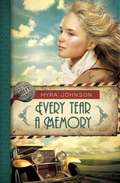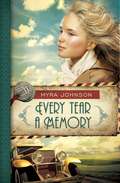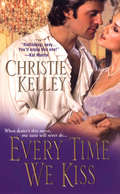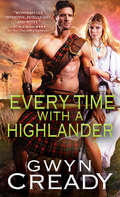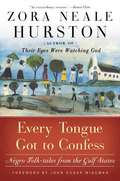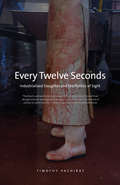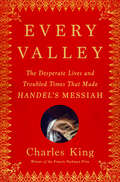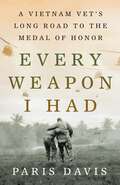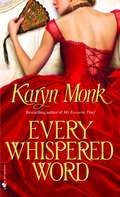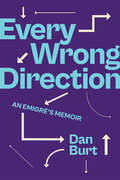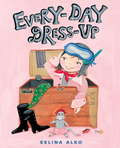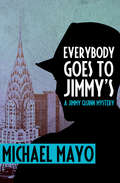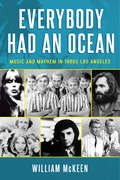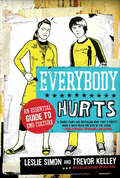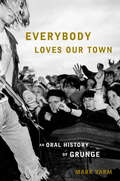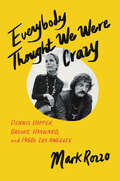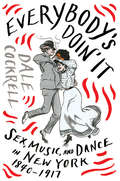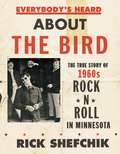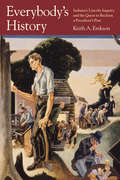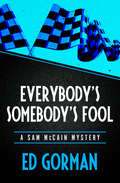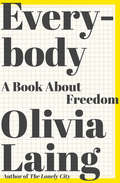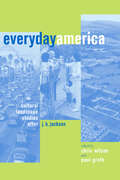- Table View
- List View
Every Tear a Memory
by Myra JohnsonJoanna Trapp found adventure serving in France as a "Hello Girl" for the Army Signal Corps, but she still mourns her doughboy sweetheart killed in battle. Returning to Hot Springs, Arkansas, she takes a job as a switchboard operator at the Arlington Hotel and quickly discovers that after her experiences overseas, civilian life proves almost too tame. Thomas Ballard still regrets he was medically ineligible to serve in the war and feels somehow inferior to those who did, especially his war-hero brother, Gilbert. When Thomas finds himself attracted to Joanna, he strives to match her adventurous spirit, when all he really wants is to settle down, raise a family, and earn respect as a successful businessman. As romance blossoms, can two such different people learn to accept not only their own but each other's God-created individuality . . . or will love change them both?
Every Tear a Memory
by Myra JohnsonJoanna Trapp found adventure serving in France as a "Hello Girl" for the Army Signal Corps, but she still mourns her doughboy sweetheart killed in battle. Returning to Hot Springs, Arkansas, she takes a job as a switchboard operator at the Arlington Hotel and quickly discovers that after her experiences overseas, civilian life proves dull. Thomas Ballard still regrets he was medically ineligible to serve in the war and feels inferior to those who did, especially his war-hero brother, Gilbert. When Thomas finds himself attracted to Joanna, he strives to match her adventurous spirit, when all he really wants is to settle down, raise a family, and earn respect as a successful businessman. As romance blossoms, can two such different people learn to accept not only their own but each other's God-created individuality . . . or will love change them both?
Every Time We Kiss (The Spinster Club #2)
by Christie KelleyGuilt Kept Them ApartIt's been five years since Lady Jennette Selby's fiancé died. Each courting season since has been filled with suitors eager to win her affection. But Jennette's guilt has prompted her to swear off marriage. For her secrets are as dark as she is beautiful, and the accidental death of her fiancé was tainted by a forbidden attraction. . . Passion Brought Them Together. Matthew Harris, the new earl of Blackburn, has been scorned by the ton for unintentionally killing Lady Jennette's fiancé. Forced to sell his estates and abandon his tenants if he does not marry a wealthy, respectable woman, Matthew turns to Lady Jennette to help him find a suitable wife. But sharing such close quarters only re-ignites an all-consuming desire neither can resist--even as every shadow of the past threatens to tear them apart. . .
Every Time with a Highlander
by Gwyn Cready"WONDERFULLY INVENTIVE, INTELLIGENT, AND WITTY." -RT Book Reviews, for First Time with a HighlanderThird in the Sirens of the Scottish Borderlands series from Gwyn Cready, the "master of time travel romance" (Booklist)She can work her magic on any manIn a quest to bring peace to her beloved Scottish borderlands, fortune-teller and spy Undine Douglas agrees to marry a savage English colonel. Desperate to delay the wedding long enough to undermine the army's plans, Undine casts a spell to summon help and unexpectedly finds herself under the imperious gaze of the handsome and talented Michael Kent, twenty-first century British theater director.But in this production, he commands the actionThough he abandoned acting years ago, Michael will play whatever part it takes to guard Undine's safety-he's used to managing London's egocentric actors and high-handed patrons, after all. But not even Shakespeare could have foreseen the sparks that fly when the colonel's plans force Undine and Michael into the roles of their lifetimes.Praise for First Time with a Highlander: "Another charmer...guaranteed to set off the kind of sexy fireworks Cready's fans expect." -RT Book Reviews 4 stars "Dashing, breathtaking...a sexy time-travel romp." -Publishers Weekly STARRED REVIEW"A delicious discovery." -Kilts and Swords
Every Tongue Got to Confess: Negro Folk-Tales from the Gulf States
by Zora Neale HurstonOver 400 folktales collected by Hurston during the 1920s. Stories cover a variety of themes and highlight the importance of the African American oral tradition.
Every Trail Has a Story: Heritage Travel in Canada
by James Raffan Bob HendersonLIMITED TIME OFFER Canada is packed with intriguing places for travel where heritage and landscape interact to create stories that fire our imagination. Scattered across the land are incredible tales of human life over the centuries. From the Majorville rock formation (dated as being older than Stonehenge), through the systems of walking trails developed by pre-contact Native Peoples, and the fur trade routes, to the more recent grand stories of the Chilkoot Gold Rush of 1897, Bob Henderson, the traveller, captures our living history in its relationship to the land – best expressed through the Norwegian quote "nature is the true home of culture." The diversity of fascinating content includes the ancient James Bay landmark (the "Wonderful" Stone); the mountain treks of naturalist Mary Schaffer Warren; the west coast observations of George Vancouver; practices such as dog sledding, warm winter camping and canoeing that allow for heritage insights; the trails of Dundas, Ontario; the exploits of missionary Gabriel Sagard; the recluse Louis Gamache of Anticosti Island; the abandoned gravesites along the coast of Newfoundland – to name but a few. As historian Michael Bliss once said, "We have to find a way to make history smell again." Author Bob Henderson brings the "fragrance of the past" into the present and invites us to imagine and participate. "Like an enthused hummingbird too eager to land, Bob Henderson leads a wide-ranging tour of the vast garden of Canadian history and landscape. Once entrusted with the scent of intrigue we are invited to follow these stories and trails deeper, make them speak and inform our own travels and impressions. Here are stepping stones and touchstones, paths toward richer engagements via a storied and fabulous past."— Alexandra & Garrett Conover, co-authors of The Snow Walker’s Companion "I pulled off the river; a log cabin set back in the woods had caught my eye. Though very old it was in good shape — there was no lock on the door. A framed note beside it read, ’Leave as you found it.’ The interior was neat and tidy, a complete set of blackened pots hung on the walls, a small stack of kindling by the open door of a Findlay stove. ’A perfect place,’ I thought to myself. As I turned to take in the rest of the cabin I saw before me Canada/Yukon rivers, Labrador fiords, Prairie medicine wheels, Superior’s north shore, portage and trail - it was all there before me, across space and time. As I stood there ghosts emerged from the walls, trappers, cowboys, ill-fated explorers, lucky canoeists — all in the same room, all eager to tell their stories. Such is the nature of Bob Henderson’s wonderful book."- Ian Tamblyn, songwriter Watch for More Trails, More Tales coming November 2014.
Every Twelve Seconds: Industrialized Slaughter and the Politics of Sight (Yale Agrarian Studies Series)
by Timothy PachiratThis is an account of industrialized killing from a participant’s point of view. The author, political scientist Timothy Pachirat, was employed undercover for five months in a Great Plains slaughterhouse where 2,500 cattle were killed per day—one every twelve seconds. Working in the cooler as a liver hanger, in the chutes as a cattle driver, and on the kill floor as a food-safety quality-control worker, Pachirat experienced firsthand the realities of the work of killing in modern society. He uses those experiences to explore not only the slaughter industry but also how, as a society, we facilitate violent labor and hide away that which is too repugnant to contemplate.Through his vivid narrative and ethnographic approach, Pachirat brings to life massive, routine killing from the perspective of those who take part in it. He shows how surveillance and sequestration operate within the slaughterhouse and in its interactions with the community at large. He also considers how society is organized to distance and hide uncomfortable realities from view. With much to say about issues ranging from the sociology of violence and modern food production to animal rights and welfare, Every Twelve Seconds is an important and disturbing work.
Every Valley: The Desperate Lives and Troubled Times That Made Handel's Messiah
by Charles KingNEW YORK TIMES NOTABLE BOOK • NEW YORK TIMES BOOK REVIEW EDITORS' CHOICE • From the bestselling historian and National Book Critics Circle Award finalist, the moving untold story of the eighteenth-century men and women behind the making of Handel&’s Messiah."A delicious history of music, power, love, genius, royalty and adventure."—Simon Sebag Montefiore, author of The World"A book of power and glory, brimming with emotion and dazzling in its reach."—Stacy Schiff, Pulitzer Prize-winning author of Cleopatra and The RevolutionaryGeorge Frideric Handel&’s Messiah is arguably the greatest piece of participatory art ever created. Adored by millions, it is performed each year by renowned choirs and orchestras, as well as by audiences singing along with the words on their cell phones.But this work of triumphant joy was born in a worried age. Britain in the early Enlightenment was a place of astonishing creativity but also the seat of an empire mired in war, enslavement, and conflicts over everything from the legitimacy of government to the meaning of truth. Against this turbulent background, prize-winning author Charles King has crafted a cinematic drama of the troubled lives that shaped a masterpiece of hope.Every Valley presents a depressive dissenter stirred to action by an ancient prophecy; an actress plagued by an abusive husband and public scorn; an Atlantic sea captain and penniless philanthropist; and an African Muslim man held captive in the American colonies and hatching a dangerous plan for getting back home. At center stage is Handel himself, composer to kings but, at midlife, in ill health and straining to keep an audience&’s attention. Set amid royal intrigue, theater scandals, and political conspiracy, Every Valley is entertaining, inspiring, unforgettable.
Every Vote Is a Prayer
by Cathy CambronAn inspiring history of the voting rights movement in America, from Frederick Douglass and Alice Paul to John Lewis, James Clyburn, and the Obamas. At the country&’s founding, voting rights were only extended to white male property owners. Although those rights had expanded to men regardless &“of their race, color, or previous condition of servitude&” in 1870, it wasn&’t until the Voting Rights Act of 1965 that barriers African Americans faced were struck down. Meanwhile, the fight for women&’s suffrage wasn&’t won until 1920. Native Americans finally gained citizenship and the right to vote in 1924, and young men of eighteen who faced military draft could not vote until 1971. For 250 years, Americans have marched and fought, been beaten and jailed—and even died—to win and protect the right to vote. Progress has been hard-won and incremental. In Every Vote Is a Prayer, Cathy Cambron chronicles those battles and urges us to remember, as Franklin D. Roosevelt said, &“Nobody will ever deprive the American people of the right to vote except the American people themselves―and the only way they could do that is by not voting at all.&”
Every Weapon I Had: A Vietnam Vet's Long Road to the Medal of Honor
by Paris DavisThe story of a Green Beret commander's heroism during the Vietnam War, and the long fight to recognize his bravery.When Col. Paris Davis was selected to lead one of the Green Beret A-teams organizing resistance to Communist incursions into South Vietnam, his commanding officer warned him that some of his soldiers would resent his authority. This was no surprise; there were only a handful of Black officers in the Special Forces. Davis quickly won the respect of his soldiers, and would soon fight beside him as bullets snapped past and mortars exploded overhead.On June 18th, Davis led a group of inexperienced locals and Special Forces soldiers in an attack on a Viet Cong base in Bong Son. They were met by a superior enemy force, and Davis led the charge in a grueling firefight. He was seriously wounded, but he disobeyed a direct order to retreat until he dragged three injured Green Berets off the battlefield to safety.Every Weapon I Had is an inspiring tale of valor and sacrifice, set against the backdrop of major escalations in both the Vietnam War and the Civil Rights movement. It is also a story of deferred honor and delayed recognition; Davis earned the Silver Star and Purple Heart for his actions, but his nomination for the Congressional Medal of Honor was repeatedly “lost.” No official reason has ever been given for this oversight, but those who fought to correct it believe that it was motivated by racial prejudice. Davis was finally awarded the Medal in 2023, 58 years after the battle.
Every Whispered Word
by Karyn MonkKARYN MONK is an award-winning,USA Todaybestselling author of passionate and witty historical romance novels, most notably her recent "orphan series" that began with THE PRISONER. Now her readers can look forward to EVERY WHISPERED WORD, the fourth book in this charming series featuring Genevieve MacPhail and her band of wayward, street savvy young men and women who turn Victorian England into their playground for romantic adventure. Filled with charm and humor, EVERY WHISPERED WORD, is Karyn Monk's p...
Every Wrong Direction: An Emigré’s Memoir
by Dan BurtEvery Wrong Direction recreates and dissects the bitter education of Dan Burt, an American émigré who never found a home in America. It begins in the row homes of Jewish immigrants and working-class Italians on the mean streets of 1950s South Philadelphia. Every Wrong Direction follows the author from the rough, working-class childhood that groomed him to be a butcher or charter boat captain, through America, Britain and Saudi Arabia as student, lawyer, spy, culture warrior, and expatriate, ending with a photo of his college rooms at St John’s College, Cambridge. Between this beginning and end, through a Philadelphia commuter college, to Cambridge, then Yale Law School, across the working to upper classes, three countries, and seven cities over 43 years, it maps his pursuit of, realization, disillusionment with and abandonment of America and the American Dream. Praise for Dan Burt's previous memoir, You Think It Strange: “Burt’s early life was indeed a triumph of wit and will. He managed to escape a world filled with violence and a culture that valued street smarts over book smarts, all the while knowing that just about everyone around him thought little of his prospects. That he made it out at all is extraordinary. That he became a successful lawyer and writer is virtually unimaginable.” —Commonweal “Dan Burt is a fine poet, and this memoir has all the sensitivity and vigilance you might expect from a writer with such a background. But his prose also has a robustness and documentary power that continually startles and engages. As it combines these things, You Think It Strange catches the strangeness of the world and makes it familiar.” —Sir Andrew Motion, Poet Laureate of the United Kingdom, 1999-2009
Every-Day Dress-Up
by Selina AlkoIt's no secret that little girls love playing dress up, but the little girl in this book ditches her princess duds in favor of costumes inspired by great women in history.Now dressing up is an adventureWhen, every day of the week,I am a daring new dame!From Supreme Court Justice Sonia Sotomayor to chef extraordinaire Julia Child to queen of jazz Ella Fitzgerald, our protagonist pays homage to the women who came before her and imagines herself in their shoes. Maybe someday she'll inspire little girls with her own gown of greatness.From the Hardcover edition.
Everybody Goes to Jimmy's
by Michael MayoAn explosion outside his speakeasy draws Jimmy into a life-or-death chase Young Jimmy Quinn is delivering a bribe for the infamous racketeer Arnold Rothstein when a bomb goes off on Wall Street, killing thirty people and scaring every banker in the city right down to his spats. Twelve years later, Rothstein is dead, and Jimmy is doing his best to stay out of trouble, running a quiet little Manhattan speakeasy. At a particularly bad moment for him and his favorite waitress, a blast rocks the alley outside and draws him right back into the madness of a dozen years ago. That morning, a strange package came in with his liquor shipment: four plain books filled with cryptic numbers. It seems the motive behind this bombing may have been the same as that behind the explosion on Wall Street more than a decade ago: money. The incident sets Jimmy off on a mad race to stay out of the line of fire, taking him from the heights of the Chrysler Building to the depths of New York's underworld.
Everybody Had an Ocean: Music and Mayhem in 1960s Los Angeles
by William MckeenLos Angeles in the 1960s gave the world some of the greatest music in rock 'n' roll history: "California Dreamin'" by the Mamas and the Papas, "Mr. Tambourine Man" by the Byrds, and "Good Vibrations" by the Beach Boys, a song that magnificently summarized the joy and beauty of the era in three and a half minutes.But there was a dark flip side to the fun fun fun of the music, a nexus between naive young musicians and the hangers-on who exploited the decade's peace, love, and flowers ethos, all fueled by sex, drugs, and overnight success. One surf music superstar unwittingly subsidized the kidnapping of Frank Sinatra Jr. The transplanted Texas singer Bobby Fuller might have been murdered by the Mob in what is still an unsolved case. And after hearing Charlie Manson sing, Neil Young recommended him to the president of Warner Bros. Records. Manson's ultimate rejection by the music industry likely led to the infamous murders that shocked a nation.Everybody Had an Ocean chronicles the migration of the rock 'n' roll business to Southern California and how the artists flourished there. The cast of characters is astonishing—Brian and Dennis Wilson of the Beach Boys, Jan and Dean, eccentric producer Phil Spector, Cass Elliot, Sam Cooke, Ike and Tina Turner, Joni Mitchell, and scores of others—and their stories form a modern epic of the battles between innocence and cynicism, joy and terror. You'll never hear that beautiful music in quite the same way.
Everybody Hurts: An Essential Guide to Emo Culture
by Trevor Kelley Leslie SimonWhat is emo? For starters it's a form of melodic, confessional, or EMOtional punk rock. But emo is more than a genre of music–it's the defining counterculture movement of the '00s. EVERYBODY HURTS is a reference book for emo, tracing its angsty roots all the way from Shakespeare to Holden Caufield to today's most popular bands. There's nothing new about that perfect chocolate and peanut butter combination––teenagers and angst. What is new is that emo is the first cultural movement born on the internet. With the development of early social networking sites like Make Out Club (whose mission is to unite "like–minded nerds, loners, indie rockers, record collectors, video gamers, hardcore kids, and artists through friendship, music, and sometimes even love") outcast teens had a place to find each other and share their pain, their opinions, and above all, their music–which wasn't available for sale at the local record store. Authors Leslie Simon and Trevor Kelley lead the reader through the world of emo including its ideology, music, and fashion, as well as its influences on film, television, and literature. With a healthy dose of snark and sarcasm, EVERYBODY HURTS uses diagrams, illustrations, timelines, and step–by–step instructions to help the reader successfully achieve the ultimate emo lifestyle. Or, alternately, teach him to spot an emo kid across the mall in order to mock him mercilessly.
Everybody Loves Our Town: A History of Grunge
by Mark YarmTwenty years after the release of Nirvana's landmark album Nevermind comes Everybody Loves Our Town: An Oral History of Grunge, the definitive word on the grunge era, straight from the mouths of those at the center of it all. In 1986, fledgling Seattle label C/Z Records released Deep Six, a compilation featuring a half-dozen local bands: Soundgarden, Green River, Melvins, Malfunkshun, the U-Men and Skin Yard. Though it sold miserably, the record made music history by documenting a burgeoning regional sound, the raw fusion of heavy metal and punk rock that we now know as grunge. But it wasn't until five years later, with the seemingly overnight success of Nirvana's "Smells Like Teen Spirit," that grunge became a household word and Seattle ground zero for the nineties alternative-rock explosion.Everybody Loves Our Town captures the grunge era in the words of the musicians, producers, managers, record executives, video directors, photographers, journalists, publicists, club owners, roadies, scenesters and hangers-on who lived through it. The book tells the whole story: from the founding of the Deep Six bands to the worldwide success of grunge's big four (Nirvana, Pearl Jam, Soundgarden and Alice in Chains); from the rise of Seattle's cash-poor, hype-rich indie label Sub Pop to the major-label feeding frenzy that overtook the Pacific Northwest; from the simple joys of making noise at basement parties and tiny rock clubs to the tragic, lonely deaths of superstars Kurt Cobain and Layne Staley. Drawn from more than 250 new interviews--with members of Nirvana, Pearl Jam, Soundgarden, Alice in Chains, Screaming Trees, Hole, Melvins, Mudhoney, Green River, Mother Love Bone, Temple of the Dog, Mad Season, L7, Babes in Toyland, 7 Year Bitch, TAD, the U-Men, Candlebox and many more--and featuring previously untold stories and never-before-published photographs, Everybody Loves Our Town is at once a moving, funny, lurid, and hugely insightful portrait of an extraordinary musical era.From the Hardcover edition.
Everybody Talks About the Weather . . . We Don't: The Writings of Ulrike Meinhof
by Elfriede Jelinek Luise Von Flotow Ulrike Meinhof Bettina Rohl Karin BauerNo other figure embodies revolutionary politics and radical chic quite like Ulrike Meinhof, who formed, with Andreas Baader and Gudrun Ensslin, the Red Army Faction (RAF), also known as the Baader-Meinhof Gang, notorious for its bombings and kidnappings of the wealthy in the 1970s. But in the years leading up to her leap into the fray, Meinhof was known throughout Europe as a respected journalist, who informed and entertained her loyal readers with monthly magazine columns.What impels someone to abandon middle-class privilege for the sake of revolution? In the 1960s, Meinhof began to see the world in increasingly stark terms: the United States was emerging as an unstoppable superpower, massacring a tiny country overseas despite increasingly popular dissent at home; and Germany appeared to be run by former Nazis. Never before translated into English, Meinhof's writings show a woman increasingly engaged in the major political events and social currents of her time. In her introduction, Karin Bauer tells Meinhof's mesmerizing life story and her political coming-of-age; Nobel Prize-winning author Elfriede Jelinek provides a thoughtful reflection on Meinhof's tragic failure to be heard; and Meinhof 's daughter--a relentless critic of her mother and of the Left--contributes an afterword that shows how Meinhof's ghost still haunts us today.
Everybody Thought We Were Crazy: Dennis Hopper, Brooke Hayward, and 1960s Los Angeles
by Mark RozzoThe stylish, wild story of the marriage of Dennis Hopper and Brooke Hayward—a tale of love, art, Hollywood, and heartbreak “Those years in the sixties when I was married to Dennis were the most wonderful and awful of my life.” —Brooke HaywardLos Angeles in the 1960s: riots in Watts and on the Sunset Strip, wild weekends in Malibu, late nights at The Daisy discotheque, openings at the Ferus Gallery, and the convergence of pop art, rock and roll, and the New Hollywood. At the center of it all, one inspired, improbable, and highly combustible couple—Dennis Hopper and Brooke Hayward—lived out the emblematic love story of ’60s L.A.The home these two glamorous young actors created for themselves and their family at 1712 North Crescent Heights Boulevard in the Hollywood Hills became the era’s unofficial living room, a kaleidoscopic realm—“furnished like an amusement park,” Andy Warhol said—that made an impact on anyone who ever stepped into it. Hopper and Hayward, vanguard collectors of contemporary art, packed the place with pop masterpieces by the likes of Roy Lichtenstein, Ed Ruscha, and Warhol, and welcomed a who’s who of visitors, from Jane Fonda to Jasper Johns, Joan Didion to Tina Turner, Hells Angels to Black Panthers. In this house, everything that defined the 1960s went down: the fun, the decadence, the radical politics, and, ultimately, the danger and instability that Hopper explored in the project that made his career, became the cinematic symbol of the period, and blew their union apart—Easy Rider.Everybody Thought We Were Crazy is at once a fascinating account of the Hopper and Hayward union and a deeply researched, panoramic cultural history. It’s the intimate saga of one couple whose own rise and fall—from youthful creative flowering to disorder and chaos—mirrors the very shape of the decade.
Everybody's Doin' It: Sex, Music, And Dance In New York, 1840-1917
by Dale Cockrell"Racy scholarship does the Grizzly Bear here with theoretical rigor." —William Lhamon, author of Raising Cain Everybody’s Doin’ It is the eye-opening story of popular music’s seventy-year rise in the brothels, dance halls, and dives of New York City. It traces the birth of popular music, including ragtime and jazz, to convivial meeting places for sex, drink, music, and dance. Whether coming from a single piano player or a small band, live music was a nightly feature in New York’s spirited dives, where men and women, often black and white, mingled freely—to the horror of the elite. This rollicking demimonde drove the development of an energetic dance music that would soon span the world. The Virginia Minstrels, Juba, Stephen Foster, Irving Berlin and his hit “Alexander’s Ragtime Band,” and the Original Dixieland Jass Band all played a part in popularizing startling new sounds. Musicologist Dale Cockrell recreates this ephemeral underground world by mining tabloids, newspapers, court records of police busts, lurid exposés, journals, and the reports of undercover detectives working for social-reform organizations, who were sent in to gather evidence against such low-life places. Everybody’s Doin’ It illuminates the how, why, and where of America’s popular music and its buoyant journey from the dangerous Five Points of downtown to the interracial black and tans of Harlem.
Everybody's Heard about the Bird: The True Story of 1960s Rock 'n' Roll in Minnesota
by Rick ShefchikIf you didn&’t experience rock and roll in Minnesota in the 1960s, this book will make you wish you had. This behind-the-scenes, up-close-and-personal account relates how a handful of Minnesota rock bands erupted out of a small Midwest market and made it big. It was a brief, heady moment for the musicians who found themselves on a national stage, enjoying a level of success most bands only dream of.In Everybody&’s Heard about the Bird, Rick Shefchik writes of that time in vivid detail. Interviews with many of the key musicians, combined with extensive research and a phenomenal cache of rare photographs, reveal how this monumental era of Minnesota rock music evolved. The chronicle begins with musicians from the 1950s and early 1960s, including Augie Garcia, Bobby Vee, the Fendermen, and Mike Waggoner and the Bops. Shefchik looks at how a local recording studio and record label, along with Minnesota radio stations, helped make their achievements possible and prepared the way for later bands to break out nationally. Shefchik delves deeply into the Trashmen&’s emblematic rise to fame. A Minneapolis band that recorded a fluke novelty hit called &“Surfin&’ Bird&” at Kay Bank Studios, the Trashmen signed with Soma Records, topped the local charts in late 1963, and were poised to top the national charts in early 1964. Hundreds of Minnesota bands took inspiration from the Trashmen&’s success, as teen dances with live bands flourished in clubs, ballrooms, gyms, and halls across the Upper Midwest. Here are the stories of bands like the Gestures, the Castaways, and the Underbeats, and the triumphs—and tragedies—of the most prominent Minnesota-spawned bands of the late 1960s, including Gypsy, Crow, and the Litter.For the baby boomers who remember it and everyone else who has felt its influence, the 1960s rock-and-roll scene in Minnesota was an extraordinary period both in musical history and popular culture, and now it&’s captured fully in print for the first time. Everybody&’s Heard about the Bird celebrates how these bands found their singular sound and played for their elated audiences from the golden era to today.
Everybody's History: Indiana's Lincoln Inquiry and the Quest to Reclaim a President's Past
by Keith A. EreksonRevered by the public, respected by scholars, and imitated by politicians, Abraham Lincoln remains influential more than two hundred years after his birth. His memory has inspired books, monuments, and museums and also sparked controversies, rivalries, and forgeries. That so many people have been interested in Lincoln for so long makes him an ideal subject for exploring why history matters to ordinary Americans as well as to academic specialists. In Everybody's History, Keith A. Erekson focuses on the Southwestern Indiana Historical Society--an organization composed of lawyers, historians, collectors, genealogists, teachers, college presidents, and newspaper editors--who joined together during the 1920s and 1930s to recover a part of Lincoln's life his biographers had long ignored: the years from age seven to twenty-one when he lived on the Indiana frontier. Participants in the "Lincoln Inquiry," as it was commonly known, researched old records, interviewed aging witnesses, hosted pageants, built a historical village, and presented their findings in public and in print. Along the way they defended their methods and findings against competitors in the fields of public history and civic commemoration, and rescued some of Indiana's own history by correcting a forgotten chapter of Lincoln's. Everybody's History traces the development of popular interest in Lincoln to uncover the story of an extensive network of nonprofessional historians who contested old authorities and advanced new interpretations. In so doing, the book invites all who are interested in the past to see history as both vital to public life and meaningful to everybody.
Everybody's Somebody's Fool (The Sam McCain Mysteries #Bk. 5)
by Ed GormanThere is a body in a gazebo, and the chief suspect is not long for this worldSmall-town lawyer and private detective Sam McCain is enjoying a cocktail party, dancing with a lovelier specimen than his five-foot-five-inch frame usually attracts, when the hostess confronts him with a problem the likes of which Good Housekeeping has never seen. There is a corpse in the backyard gazebo, and the party is definitely over.The murdered girl was the twenty-year-old daughter of the town&’s Cadillac dealer, a troubled young woman with a self-destructive streak. The police focus their investigation on her drag-racing boyfriend, local bad boy David Egan, whom McCain agrees to defend. When Egan dies in a freak car accident, the case seems closed. But examining the hot rod shows a cut brake line—and a motive for a killing far more complicated than good girl gone bad.
Everybody: A Book About Freedom
by Olivia Laing"Astute and consistently surprising critic" (NPR) Olivia Laing investigates the body and its discontents through the great freedom movements of the twentieth century. The body is a source of pleasure and of pain, at once hopelessly vulnerable and radiant with power. In her ambitious, brilliant sixth book, Olivia Laing charts an electrifying course through the long struggle for bodily freedom, using the life of the renegade psychoanalyst Wilhelm Reich to explore gay rights and sexual liberation, feminism, and the civil rights movement. Drawing on her own experiences in protest and alternative medicine, and traveling from Weimar Berlin to the prisons of McCarthy-era America, Laing grapples with some of the most significant and complicated figures of the past century—among them Nina Simone, Christopher Isherwood, Andrea Dworkin, Sigmund Freud, Susan Sontag, and Malcolm X. Despite its many burdens, the body remains a source of power, even in an era as technologized and automated as our own. Arriving at a moment in which basic bodily rights are once again imperiled, Everybody is an investigation into the forces arranged against freedom and a celebration of how ordinary human bodies can resist oppression and reshape the world.
Everyday America: Cultural Landscape Studies after J. B. Jackson
by Chris Wilson and Paul GrothAs old as a roadway that was once a Native trail, as new as the suburban subdivisions spreading across the American countryside, the cultural landscape is endlessly changing. The study of cultural landscapes—a far more recent development—has also undergone great changes, ever broadening, deepening, and refining our understanding of the intricate webs of social and ecological spaces that help to define human groups and their activities. Everyday America surveys the widening conceptions and applications of cultural landscape writing in the United States and, in doing so, offers a clear and compelling view of the state of cultural landscape studies today. These essays—by distinguished journalists, historians, cultural geographers, architects, landscape architects, and planners—constitute a critical evaluation of the field’s theoretical assumptions, and of the work of John Brinckerhoff Jackson, the pivotal figure in the emergence of cultural landscape studies. At the same time, they present exemplary studies of twentieth-century landscapes, from the turn-of-the-century American downtown to the corporate campus and the mini-mall. Assessing the field’s accomplishments and shortcomings, offering insights into teaching the subject, and charting new directions for its future development, Everyday America is an eloquent statement of the meaning, value, and potential of the close study of human environments as they embody, reflect, and reveal American culture.
